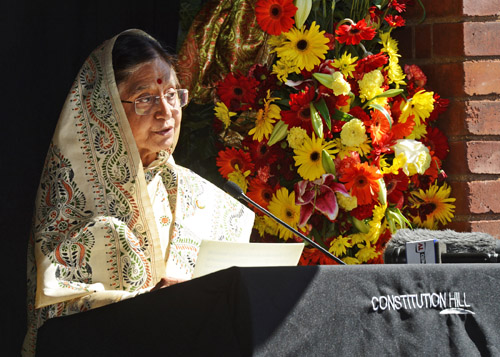Speech by Her Excellency the President of India, Shrimati Pratibha Devisingh Patil at the Unveiling of Mahatma Gandhi's Bust at Constitutional Hill in Johannesburg, South Africa
Constitution Hill, Johannesburg, South Africa : 03-May-2012

Dear Friends,
Distinguished Guests, Ladies and Gentlemen,
It's a great pleasure, honour and privilege for me to unveil the bust of Mahatma Gandhi in this prestigious Constitutional Court Complex of South Africa. This is the place where Gandhiji served four terms of imprisonment between 1908 and 1913, including his very first sentence in South Africa in this Number Four Cell. Many of the prisoners here were guilty of non-political crimes but some including Gandhiji were charged for resisting the unjust race laws. Gandhiji raised his voice against discrimination and humiliation and against an oppressive colonial rule. Respected Nelson Mandela was also imprisoned in this old fort for some time. Writing in 1994, to mark the 125th birth anniversary of Gandhiji, which was also the year, freedom and democracy dawned in South Africa, Nelson Mandela describing his affinity with Gandhiji wrote, "Though separated in time, there remains a bond between us, in our shared prison experiences, our defiance of unjust laws and in the fact that violence threatens our aspirations for peace and reconciliation."
South Africa is the place where the world witnessed for the first time Gandhi's contribution to political transformation through non-violence and peaceful dialogue. Our historical links with the struggle for freedom and justice in South Africa date back to that period. This is a country with which India and the people of India have very deep rooted links- links that have changed the course of India's history. The people of India owe a deep sense of gratitude to South Africa for giving us the Mahatma. During the 21 years of his stay in South Africa, he shaped his philosophy of 'Satyagraha and Non-Violence', which later became potent tools for liberation of the people of India from the yoke of colonialism. Gandhiji worked with firm conviction on the principles of truth and non-violence, with unshakeable faith and determination he walked the untrodden path, which often seemed like a dark tunnel, but achieved light and freedom for India in the end.
We cherish our historical and deep emotional links with South Africa. Not only do we share the history against colonialism, racism and tyranny, but we also share a commitment to democracy, to respecting the rule of law, to promoting global peace and security, social justice and waging a war on poverty and unemployment. Our countries uphold the fundamental principles of peace, non-violence and dialogue to maintain the global order of equality and justice based on Gandhian values. The decision by the United Nations to observe October 2 - Gandhiji's Birthday as the International Day of Non-Violence points to the recognition of Gandhiji's philosophy as an instrument for promoting peace in the world.
I hope that the Gandhiji's bust will symbolize the values that are enshrined in the histories of India and South Africa, and underpin our continuing resolve to fight injustice and inequality in the world.
Thank You.
